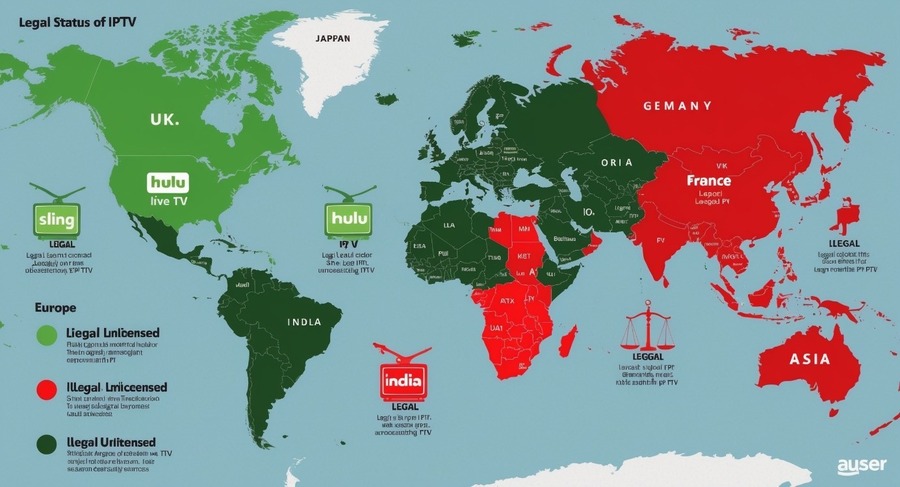Table of Contents
- What is IPTV?
- Is IPTV Subscription Legal?
- Legal vs. Illegal IPTV Services
- Legal Issues Surrounding IPTV Subscriptions
- How to Choose a Legal IPTV Service
- The Future of IPTV and Legal Considerations
- Frequently Asked Questions (FAQs)
- Conclusion
- Further Reading and Resources
What is IPTV 4K?
IPTV (Internet Protocol Television) is an era that promises television content material over the net in place of traditional broadcast techniques like cable or satellite TV for pc. This provider lets customers flow live TV channels, watch motion pictures on call for (VoD), and get admission to media content that is time-shifted (e.g., the ability to watch a display after it has aired). IPTV has received giant popularity because of its flexibility, type of content material, and often decreased fees compared to conventional TV services.
There are 3 predominant types of IPTV offerings:
- Live Television: This form of IPTV 4K lets users observe TV channels in actual time, just like traditional cable or satellite TV.
- Video on Demand (VoD): With VoD, users can choose and watch content from a library of videos at their convenience.
- Time-Shifted Media: This allows visitors to observe indicates and programs that were aired formerly, offering extra flexibility in viewing schedules.
These offerings work by transmitting video statistics over the net, which users can get entry to through diverse devices, together with smart TVs, computers, capsules, and smartphones. As IPTV continues to develop in reputation, it is essential for users to understand the legal aspects of subscribing to and using these services.
Is IPTV Subscription Legal?
The legality of IPTV subscriptions is a complicated problem that varies with the Country And the particular provider in query. In the wellknown, IPTV itself is not illegal. However, the legality of an IPTV provider relies upon whether it has received the proper licenses and permissions to distribute the content it gives. Let’s discover how this performs in distinct areas.
 IPTV in the United States
IPTV in the United States
In the United States, IPTV offerings are legal as long as they have the vital licenses to broadcast the content material they provide. Services like Sling TV and Hulu Live TV are examples of criminal IPTV vendors due to the fact they’ve agreements with content creators and broadcasters. However, many unlicensed IPTV offerings perform illegally by using streaming copyrighted content material without permission. Users subscribing to these illegal offerings may face felony effects if stuck.
IPTV in Europe
The legality of IPTV in Europe varies by United States of America. IPTV in the UK, for instance, using unlicensed IPTV offerings is unlawful and might result in prison action against both companies and customers. The European Union has stringent copyright legal guidelines that shield content material creators, making it crucial for IPTV services to secure the right licensing. Countries like Germany and France have also taken sturdy stances towards unlawful IPTV, main to considerable fines and prison repercussions for the ones worried.
IPTV in Asia
In Asia, the felony panorama of IPTV is further varied. Some countries, like Japan, have strict copyright legal guidelines that make unlicensed IPTV services illegal. In evaluation, different countries may have much less stringent rules main to the proliferation of illegal IPTV offerings. For example, India has visible a vast upward thrust inside the variety of IPTV services, but the felony status of these offerings can be murky because of varying local regulations.
Legal vs. Illegal IPTV Services
Understanding the difference between legal and illegal IPTV offerings is critical for users who need to avoid ability felony troubles. Here’s how you could differentiate between the 2 :
 Characteristics of Legal IPTV Services
Characteristics of Legal IPTV Services
Legal IPTV services usually :
- Have Licensing Agreements: Legal vendors have acquired the necessary licenses to distribute the content material they offer. This ensures that content creators and broadcasters are compensated for their work.
- Offer Reputable Services: Companies like Sling TV, YouTube TV, and Hulu Live TV are famous legal IPTV UK These offerings are transparent about their operations and observe copyright laws.
How to Identify Illegal IPTV Services
Illegal IPTV services, however, frequently:
- Offer Suspiciously Low Prices: If a service gives a deficient charge for a substantial choice of channels and on-demand content material, it’s, in all likelihood, too correct to be actual.
- Lack of Proper Licensing: These offerings no longer have the essential permissions to broadcast the content they offer, making their operation unlawful.
- Pose Security Risks: Illegal IPTV offerings may additionally expose customers to malware, phishing attacks, and other protection threats.
Risks of Using Illegal IPTV Services
Using illegal IPTV services could have severe results, including:
- Legal Consequences: Users stuck subscribing to or selling unlawful IPTV services can also face fines or legal movement.
- Security Risks: Illegal IPTV offerings frequently lack security features, putting customers liable to malware and different cyber threats.
Legal Issues Surrounding IPTV Subscriptions
IPTV services, especially the ones working illegally, raise numerous legal problems, usually revolving around copyright infringement and piracy.
Copyright Infringement
One of the maximum enormous criminal issues with unlawful IPTV offerings is copyright infringement. These offerings regularly circulate content with out obtaining the essential rights from content creators or broadcasters. This violation of copyright legal guidelines can result in widespread consequences for each provider and user.
Piracy Concerns
IPTV has come to be a first-rate player within the global of virtual piracy. By streaming unauthorized content, illegal IPTV services contribute to the enormous trouble of piracy, which has a damaging effect on the enjoyment enterprise. According to a 2022 record by means of the U.S. Chamber of Commerce, virtual piracy costs the U.S. Economy up to $29.2 billion yearly.
Enforcement of Laws
Governments and copyright holders are more and more cracking down on unlawful IPTV services. Recent cases, including the takedown of Xtream Codes in Europe, highlight the extreme criminal repercussions that can get up from running or using unlawful IPTV offerings. Penalties for customers can include fines, while carriers can also face imprisonment and sizeable monetary consequences.
How to Choose a Legal IPTV Service
Choosing a prison IPTV carrier is essential to avoid the risks associated with unlawful services. Here are some key concerns to keep in mind:
Key Considerations
- Licensing and Content Agreements: Verify that the IPTV issuer has the essential licenses to distribute the content they provide. This data is typically to be had on the company’s website.
- User Reviews and Reputation: Look for reviews from different users to gauge the reliability and legality of the service. A well-hooked-up popularity is often a proper indicator of legitimacy.
- Customer Support and Transparency: Legitimate services provide customer support and have clean phrases of provider, which can be signs of a straightforward provider
Questions to Ask Before Subscribing
- Is the service licensed to distribute content?
- What channels and content are available legally?
- Does the provider have a clear and transparent privacy policy?
 The Future of IPTV and Legal Considerations
The Future of IPTV and Legal Considerations
As the popularity of IPTV keeps growing, so does the need for clean criminal guidelines and policies. The destiny of IPTV is probably to see:
Trends in IPTV Usage
The call for for IPTV is anticipated to upward thrust, pushed by way of the growing choice for on-demand content and the flexibility of internet-primarily based TV services. According to a record by means of Grand View Research, the global IPTV market length turned worth USD seventy two.24 billion in 2020 and is anticipated to expand at a compound annual boom price (CAGR) of 7.4% from 2021 to 2028.
Potential Changes in IPTV Regulations
As IPTV grows, so too will the regulatory scrutiny. Governments should introduce stricter regulations to combat unlawful IPTV services. This should consist of more rigorous enforcement of copyright legal guidelines and extra consequences for the ones stuck using or supplying illegal services.
Impact on Consumers
Consumers may also see changes in the availability and pricing of IPTV offerings as regulations evolve. Legal IPTV companies may additionally want to regulate their enterprise models to conform with new laws, potentially affecting the price and variety of content available to customers.
Frequently Asked Questions (FAQs)
- Is it illegal to use IPTV?
-
- It depends on the provider. Legal IPTV carriers have proper licensing, even as illicit offerings do not.
- How can I tell if an IPTV service is legal?
-
- Look for licensing statistics, patron opinions, and transparency of their operations.
- What are the risks of using an illegal IPTV service?
-
- Users face felony movement, fines, and safety risks such as malware.
- Are there legal alternatives to IPTV?
-
- Yes, offerings like Sling TV, Hulu Live TV, and YouTube TV are criminal alternatives with the proper licensing.
Conclusion
In conclusion, while IPTV offers a flexible and often cost-effective way to access television content, it’s crucial to ensure that the service you choose is legal.

